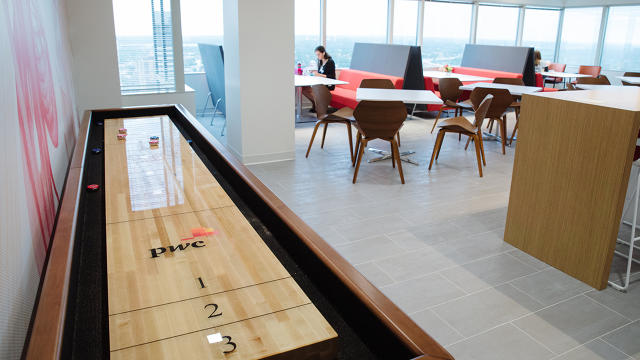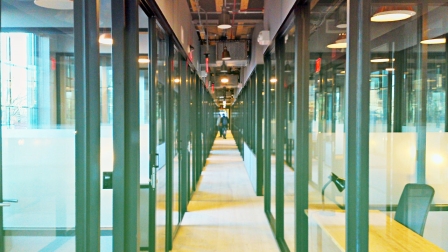A New Company Aims To Edge In On WeWork With A Totally New Business Model
WeWork, a company that offers shared, flexibile-lease offices in 113 locations in 33 countries, has achieved a position in the “coworking” world similar to that of Starbucks in the coffee world. While plenty of smaller companies offer coworking in a myriad of flavors—focusing, for instance, on designers or startups—they’re not a significant threat to WeWork’s business. No Dunkin’ Donuts has emerged. A bigger potential problem for WeWork as it strives to live up to its $16 billion valuation would be if the landlords and companies it works with build their own hip office spaces.
A new outlet created by two of WeWork’s former employees aims to help landlords and corporations do just that.
WeWork’s basic business model is simple: The company rents large chunks of office space, breaks up that space into tiny offices and communal work spaces, sprinkles in good design and community features, and then subleases it to tenants at a huge mark-up. Landlords could make more money if they skipped the lease with WeWork and directly subleased to tenants, but typically, they don’t want to deal with all of the hassle involved in running a coworking space. “At the end of the day, it’s enormously human-labor intensive and operationally intensive,” says Bryan Woo, the director of acquisitions at real estate developer Young Woo. “[It’s like saying to a landlord], ‘Why don’t you operate the hotel?'”
The former WeWork employees’ new company, which does not yet have a name, removes some of this hassle by offering what Mark Kennedy, a partner on the project who has a background in private equity and real estate, has called “coworking in a box.”
“[Landlords] don’t want to go to PivotDesk or WeWork and give them a lease,” Kennedy says, referring to the long-term contracts landlords offer those companies, who then sublease them on a flexible basis. “But they don’t just want to turn the key on their own coworking space and say, ‘I hope this works.’ So that opens the door for us.”
Kennedy and his two cofounders (both of whom, Kennedy says, asked not to be named because of their relationship with WeWork) will work as project managers to coordinate the construction, design, and engineering of coworking spaces. They have also partnered with service providers, such as cleaning and security companies, that will help operate the spaces. Landlords will have the option of managing the premises themselves, asking the startup to operate it under a profit-sharing agreement, or partnering with a third-party operator (which could, Kennedy says, be another coworking brand).
The new, yet-to-be-named company has also partnered with corporations who want to incorporate some version of “coworking” into their own offices rather than rent space in a company like WeWork. One, a large pharmaceutical company, is building a 40,000-square-foot office building in which workers have no assigned seating. They come in every day and sit where they want, and the company plans to open up the extra desks to outside entrepreneurs.
Though WeWork has built its business on offering flexible office space to small startups and freelancers, recently it has been courting bigger corporate clients. About 10% of Fortune 500 companies, according to WeWork, lease space in one of its locations (most rent a relatively small number of desks), and it offers discounts to companies based on volume and length of lease. WeWork recently posted a job for a head of enterprise sales.
WeWork’s hip energy and collaborative environment are key selling points in its pitch to potential subleasers. But with or without WeWork’s ex-employees’ new venture (which hasn’t publicly launched yet), some corporations have tried to create a similar vibe on their own. Since 2011, the consulting firm PwC, for instance, has redesigned 35 of its U.S. offices to be more like coworking spaces, with flexible work areas and fewer square feet dedicated to each individual employee. “Our strategy is how to create WeWork within PwC,” says Toni Cusumano, a principal in the company’s global human capital practice.

WeWork, too, has considered the business of bringing WeWork’s space and operations expertise into corporations’ offices rather than bringing large companies into WeWork.
Earlier this year, WeWork COO Artie Minson told me that WeWork could help companies “rethink corporate headquarters” and how to operate buildings and communities digitally. He called this “an interesting direction and opportunity the business could take.” WeWork CEO Adam Neumann described how he would put WeWork’s operating capabilities into another building. “It sounds simple: How you manage an event book, register a conference room, manage ordering of milk and coffee?” he said. “But there’s nothing simple about it. Most companies doing it today are wasting money and wasting space. By using our app and powering it with an app you’ll be able to save money and space, but more importantly, create an energy.”
Another company, Managed By Q, sells a similar idea, minus the “energy.” It installs an iPad in each of its client’s offices through which they can coordinate services such as cleaning, handyman work, and catering.
Kennedy is confident that he’s got the energy covered, too. He says that landlords who hire the new firm can say, “We’re going to keep our real estate, and we’ll hire people from the outside to create this energy.”
Fast Company , Read Full Story
(39)













